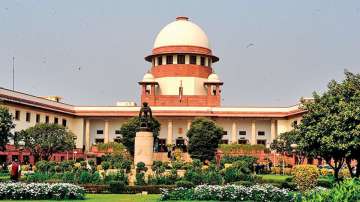Supreme Court to deliver verdict on abrogation of Article 370 on December 11
The Supreme Court will deliver the verdict on pleas challenging the abrogation of Article 370 on December 11. A five-judge bench headed by Chief Justice DY Chandrachud had reserved its order on the matter on September 5.

Abrogation of Article 370: The Supreme Court will deliver a verdict on pleas challenging the abrogation of Article 370 on December 11. A constitutional bench comprising Chief Justice of India (CJI) DY Chandrachud and Justices Sanjay Kishan Kaul, Sanjiv Khanna, BR Gavai, and Surya Kant is set to announce its verdict on a series of petitions that challenge the Central government's 2019 decision to revoke Article 370 which conferred special status on the former State of Jammu and Kashmir.
The Supreme Court on September 5 had reserved its verdict on a batch of pleas challenging the abrogation of Article 370 of the Constitution. A five-judge bench headed by Chief Justice DY Chandrachud reserved the verdict after a marathon 16-day hearing.
Abrogation of Article 370
Several petitions challenging the abrogation of Article 370 and the Jammu and Kashmir Reorganisation Act, 2019 that divided the erstwhile state into two union territories - Jammu and Kashmir, and Ladakh - were referred to a Constitution bench in 2019.
On August 5, 2019, the Central government announced the revocation of the special status of Jammu and Kashmir granted under Article 370 and split the region into two Union territories.
The Centre abrogated the special status of Jammu and Kashmir under Article 370, soon after the second term of the PM Modi-led government began. Included in the Constitution on October 17, 1949, Article 370 exempts J&K from the Indian Constitution (except Article 1 and Article 370 itself) and permits the state to draft its own Constitution.
What happened during 16 days of marathon hearings?
During the course of the hearing, the top court had heard Attorney General R Venkataramani, Solicitor General Tushar Mehta, senior advocates Harish Salve, Rakesh Dwivedi, V Giri and others on behalf of the Centre and the intervenors defending the abrogation of Article 370.
Senior advocates including Kapil Sibal, Gopal Subramanium, Rajeev Dhavan, Zaffar Shah, Dushyant Dave and others had argued on behalf of the petitioners.
The petitioner said that Article 370 was not a repository of untrammelled power but a medium through which the Constitution would apply to the state.
"Even though the word 'temporary' appears in the marginal notes of Article 370 of the Constitution, the resolution passed by the Jammu and Kashmir constituent assembly said that the Constitution of India must apply with these modifications. The constitution of Jammu and Kashmir and the Indian Constitution were speaking to each other through Article 370," senior advocate Gopal Subramanium, appearing for petitioner Muzaffar Iqbal Khan said.
The Supreme Court termed as "unacceptable" the submission that Article 370 of the Constitution ceased to operate once the term of the constituent assembly of Jammu and Kashmir ended in 1957 after drafting the state's Constitution.
Solicitor General Tushar Mehta, appearing for the Centre, said there is enough material to show that the Constitution of Jammu and Kashmir is subordinate to the Constitution of India and the constituent assembly of J-K was in reality a legislative assembly making laws.
The Solicitor General also told the apex court that the central government will restore the statehood of Jammu and Kashmir, but Ladakh will remain a Union Territory.
The Centre's top law officers asserted there was no "constitutional fraud" in annulling the provision that accorded special status to the erstwhile state of Jammu and Kashmir.
Also Read: Supreme Court reserves verdict on petitions challenging abrogation of Article 370